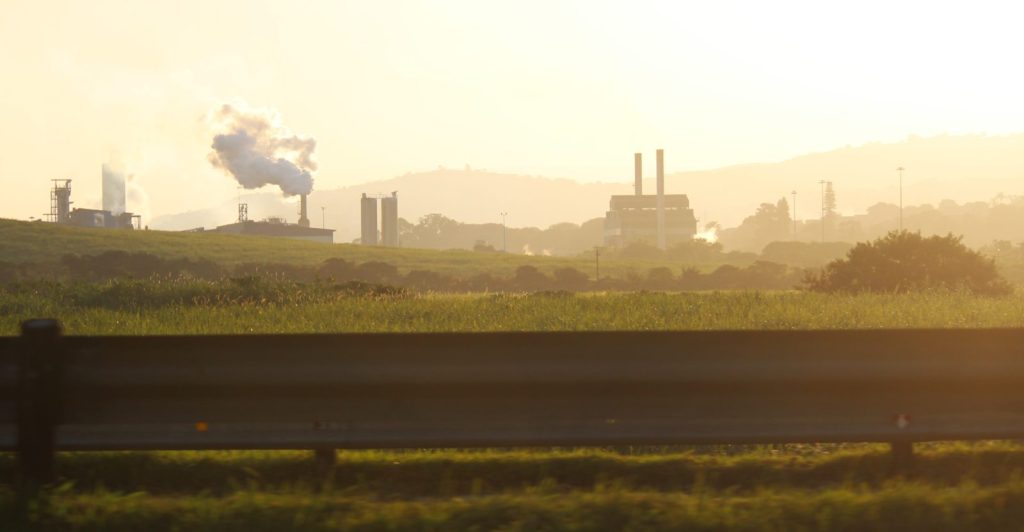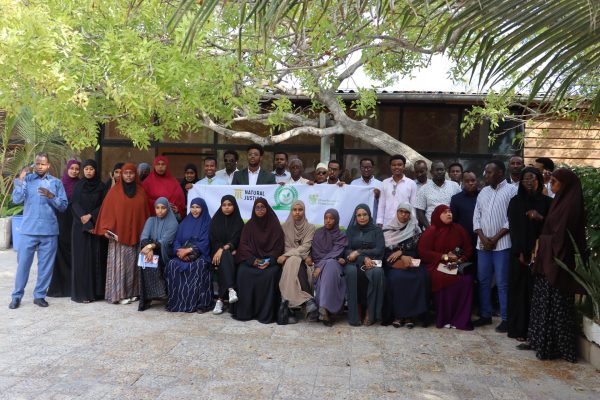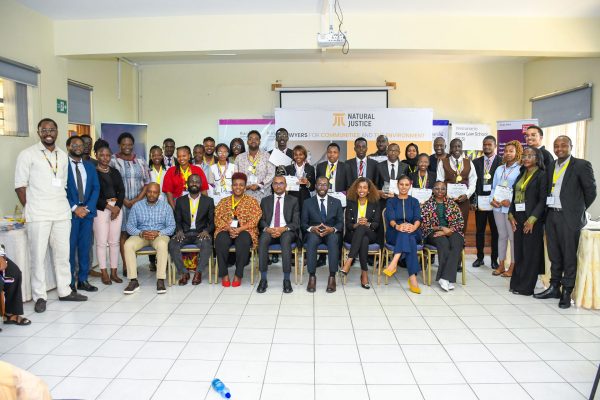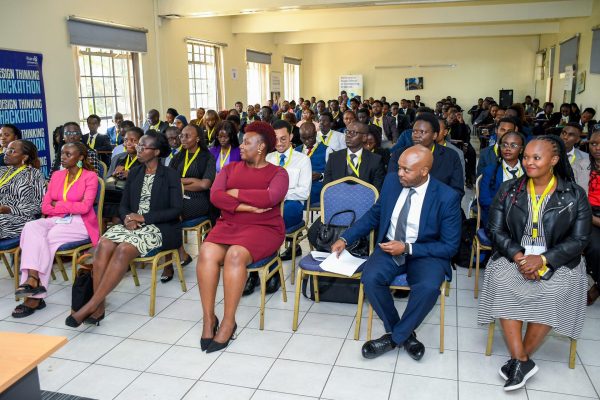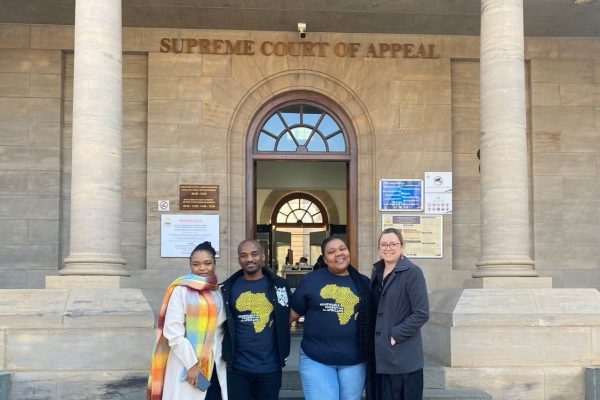South Africa’s eastern coastline, where the Indian Ocean licks the shores of the Wild Coast and KwaZulu- Natal, has fast become hot property for the oil and gas industry. As a result, those with roots in nearby towns and cities find themselves surrounded by majestic, untamed beaches while heavily flanked by historic polluting industrial fossil fuel infrastructure, and a growing fossil fuel industry – posing health and environmental threats to communities.
Sitting pretty and poised in the lap of KwaZulu-Natal’s coast is the busy harbour town of Richards Bay. Once a little fishing village, it is believed that Richards Bay has the deepest natural harbour in Africa, attracting tourists and development over the years.
Although much of the area is still rural, mining is considered an important sector for the economy. A quick Google search and you’ll learn that Richards Bay is one of the country’s industrial hotspots because of its coal terminal, port and aluminium smelters. Driving through the town, it’s difficult not to notice large plumes of billowing air pollution from numerous factories and developments. People living there have, for years, been in the thick of it – directly impacted by mines and factories dotting the landscape.
However, in recent years there’s been a shift. Impacted or affected residents and communities, particularly fishing communities and civil society groups have steadily begun to push back.
Civil society takes a civil approach
To cite an example, there’s a contentious plot of land which has been earmarked for development in the area. Civil society organisations, representing communities, have been fighting to prevent a proposed 3,000MW gas-to-power plant from being built there, by state-owned enterprise, Eskom. The gas-to-power plant would be fuelled by gas via a pipeline that would be installed from the Richards Bay Port and would supply up to 3,000MW of energy. The pipeline is not yet built, nor authorised. However, the gas-to-power plant received environmental authorisation in December of 2019.
In August 2024 the matter was heard in the Supreme Court of Appeal. Environmental justice organisation South Durban Community Environmental Alliance (SDCEA) and groundWork were both litigants in the matter which landed in the SCA as an appeal against the Pretoria High Court judgment that had previously declined to set aside the environmental authorisation granted to Eskom for the gas power plant. This despite the court finding that the public participation process was flawed.
Judgment was reserved in SCA. At the time Paul-Micheal Keichel, from environmental law firm Cullinan & Associates, representing the SDCEA and groundWork, supported by Natural Justice, said that it was “a very high impact case, the result of which would have repercussions for all of those who care about the environment.”
There are multiple other gas developments proposed in Richard’s Bay as this area is planned as a “gas hub” in South Africa, which will have consequent and cumulative impacts.
Moreover, threats are posed both on and offshore. In 2021 in Durban South, SDCEA, supported by Natural Justice and Green Connection, went to court to challenge a government decision to authorise Eni South Africa and Sasol to explore for oil and gas in Block 236 off the Kwa-Zulu Natal coast. This matter is ongoing as applicants are set to file further court papers by 15 December 2024.
Given the potential health and environmental risks from mining and factories, coupled with social issues such as rising unemployment and crime, increasing electricity costs despite loadshedding, some locals have been considering alternatives for the wellbeing of their families, communities and their pockets. The idea of using renewable energy has also become more attractive.
Power to the people through the Just Energy Transition (JET)
Earlier this year, at workshops hosted by Natural Justice and SDCEA, participants from Durban South and Richards Bay discussed various renewable energy options such as solar power and biogas.
Through these workshops, Natural Justice and SDCEA have been liaising with communities about the Just Energy Transition and the move from fossil fuels to renewable energy. The aim is to raise awareness so that communities have a fair and fighting chance to decide on power sources that would best serve their lifestyles, livelihoods and that would not be harmful to their environment or their health.
Conversations soon steered towards power sources, electricity generation and costs and challenges facing communities.
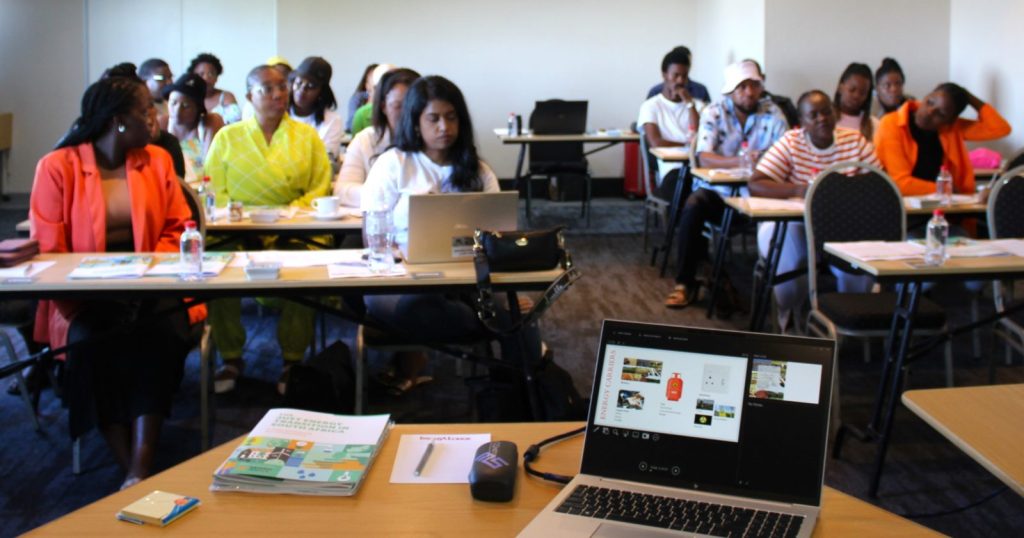
A JET workshop held in Richards Bay.
Power generation for future generations
Wally Williams from Nseleni Township in Richards Bay, works in the public health sector and belongs to the Forefront Humanitarian Organisation. He was interested in finding new ways to curb the challenges – such as loadshedding, air pollution, water pollution, deforestation- facing his community.
He said the workshop provided the space to share their experiences and consider solutions. “Because it is not all about us. It’s about the next generation, we’ve got children now – we’ve got to the next generation we have to take care of.”
Bongiwe Kuzani, Nseleni, Ward 7, Richards Bay said: “It’s important for me personally because electricity is expensive. I need to find ways to save money on electricity and use that money elsewhere. Now I’m earning less than before. So, I need to be able to save – to find more ways to save- and if I can save on electricity I would have done my job as a mom.”
Samke Williams, also from Nseleni Township, said there were many problems in the community, particularly with issues of air pollution affecting people’s health.
“There is an old mine on that side it’s affecting the people. We have the gumtrees and everything… they are burning everything there. So, the gasses always.”
“A lot of people are getting sick each and every day we also have the problem of electricity. We want to know what we can do and what can help us…So we’ll take that information and bring back to our communities and work together and see where we can help each other.”
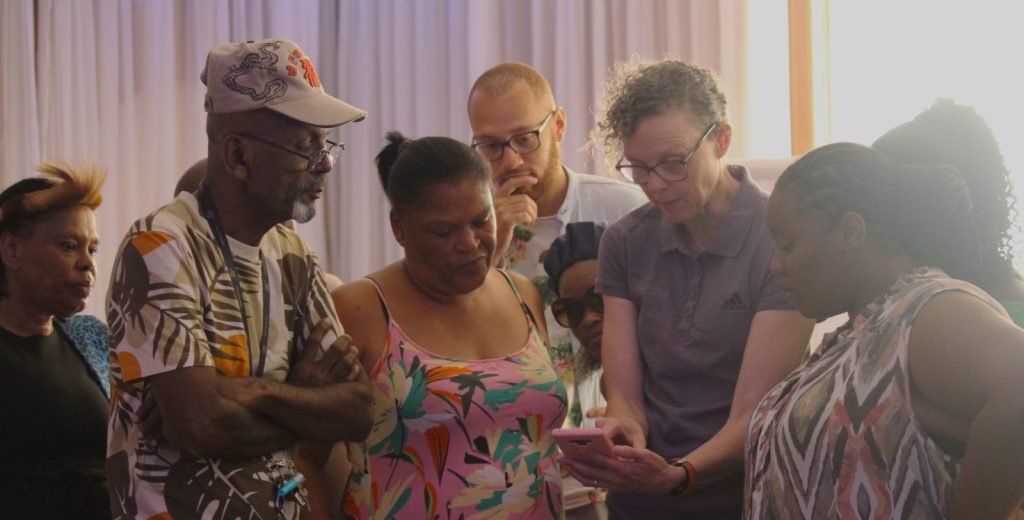
Professor Tracy-Lynne Field sharing information about alternative energy sources during a JET workshop in Durban South.
Do we have the energy for renewables?
Further along the coast in Durban South, power supply and unemployment were key areas of concern. Many of the communities in Durban South rely on existing factories for employment and a move to renewable energy should therefore be dually considered as an employment opportunity they said.
Tristan Meek, Wentworth, South Durban resident said: “The thing with renewable energy is looking for new modernized ways to tackle the old ways of using coal and the bad uses of energy. I think it would help to talk about the Just Energy transition, or the Just Transition, just as it is – that it would be fair to everyone. That would be useful in creating jobs in our country, which is a high-risk country with job employment. Also, to focus on new and modernized ways…about renewable energy.”
Meek was most interested in the different types of renewable energy available.
“Most of the renewable energy plans that we have, like the biogas and the solar as well as hydro and wind power, these are good alternatives. We will still get questioning about where they are situated and the process of making this type of energy, but – it would be significantly better than coal or nuclear power.”
For Desiree Bishop, another Wentworth resident, she wanted to know about the different types of energy – particularly the popular solar energy resources that will help the move away.
“If it’s affordable for us people who are of a low income, because a lot of people in our community are not working. So, to see if we could also afford the solar system and also because our lights are so high.”
“We need to hear more, and also because we need to educate our people, we need to take stuff back into our communities to educate them and tell them what is happening and where we are at now,” she said.
Adding the proverbial “fuel to the fire”, South Africa’s government continues to push an agenda that motivates the use of gas as a “transitional fuel”, away from fossil fuels towards greener sources of power.
While the fight for a just transition and a move away from fossil fuels evidently remains pertinent for all of Africa, communities like these in Richard’s Bay and Durban South on South Africa’s eastern coast, have been championing a way forward.
A shift in thinking and the desire to make significant changes to people’s lifestyles and livelihoods will need continued support from all players at grassroots levels if we are to influence policy and lawmakers towards a just transition for future generations.

